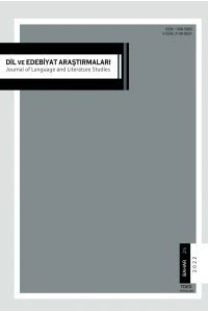Korku Edebiyatında Bir Devrim: Frankenstein ve The Vampyre
Victoria Gotik Edebiyatı, Mary Shelley, John William Polidori, Frankenstein, The Vampyre
A Revolution in Horror Literature: Frankenstein and The Vampyre
___
- Abrams, Meyer Howard ed. (1987), The Norton Anthology of English Literature, New York: W. W. Norton & Company, Fifth Edition.
- Browning, Elizabeth Barrett, The Cry of the Children, Retrieved from: https://www.poetryfoundation.org/poems/43725/the-cry-of-the-children (Access date: 23.09.2019).
- Buzwell, Greg (2014.05.15), Mary Shelley, Frankenstein and the Villa Diodati Retrieved from: https://www.bl.uk/romantics-and-victorians/articles/mary-shelley-frankenstein-and-the-villa-diodati (Access date: 05.05.2019).
- Cartwright, Mark (2013.04.20), Prometheus, Retrieved from: https://www.ancient.eu/Prometheus/ (Access date: 02.05.2019).
- Clayton Paul, Judith Rowbotham (2009), “How the Mid-Victorians Worked, Ate and Died”, International Journal of Environmental Research and Public Health, 6, pp. 1235-1253, doi:10.3390/ijerph6031235.Gonzalez de Leon, Maria (2014.11.28), The Modern Vampire Is Inspired by This
- Brilliant and Fairly Unknown Work. Retrieved from: http://www.faena.com/aleph/articles/the-modern-vampire-is-inspired-by-this-brilliantand-fairly-unknown-work/ (Access date: 08.05.2019).
- Jackson, Kevin (2016.05.17), The haunted summer of 1816, Retrieved from: https://www.prospectmagazine.co.uk/arts-and-books/sumer-1816-frankenstein-shelley-byron-villa-diodati (Access date: 01.05.2019)
- Mellor, Anne (2006), The Cambridge Companion to Mary Shelley. Making a“monster”: an introduction to Frankenstein, Cambridge: Cambridge University Press, pp. 9-25.
- Mitchell, Sally (2009), Daily Life in Victorian England, London: Greenwood Press, Second Edition.
- Moers, Ellen (1974), Female Gothic: The Monster’s Mother, pp. 3-5.
- Polidori, John William (1819), The Vampyre, Freeditorial Publishing House.
- Radford, Benjamin (2014.10.23), Vampire: Facts, Fiction and Folklore, Retrieved from: https://www.livescience.com/24374-vampires-real-history.html (Access date: 26.09.2019)
- Rosetti, William Michael (1911), The Diary of Dr. John William Polidori: 1816: relating to Byron, Shelley, etc., London: Immortal Literature Series.
- Shelley, Mary (2012), Frankenstein, Ankara: Engin Original Gold Classics.
- ISSN: 1308-5069
- Yayın Aralığı: 2
- Başlangıç: 2010
- Yayıncı: TÜRKİYE DİL VE EDEBİYAT DERNEĞİ
Toplumsal Çatışmalar Bağlamında Sabahattin Ali’nin “Ayran” Hikâyesi
Osmanlı Son Dönem Çeviri Yöntemleri Üzerine Bir İnceleme
Yahya Kemal’in “Ses” Adli (“Ver” Redifli) Rubaisinin Çözümlenmesi
Ordu’da Körüklü Çizme ve Türkay Yavaş Ustanın Tekniği
Türkçe Öğretiminde Aşkın Bir Millî Kimlik Alanı: Salur Kazan’ın Evinin Yağmalandığı Destan
Eski Türk Edebiyatı Araştırmalarında Bir Kaynak Olarak İki Dilli Latin Harfli Tarihî Sözlükler
Öğretmen Adaylarının Metin Özetleme Stratejilerini Kullanım Tercihleri
Eski Uygurlarda Mani Yazısının Gelişimi
Jung Teorisi Bağlamında Hasan Ali Toptaş’ın Sonsuzluğa Nokta Romanı Üzerine Arketipsel Bir Okuma
